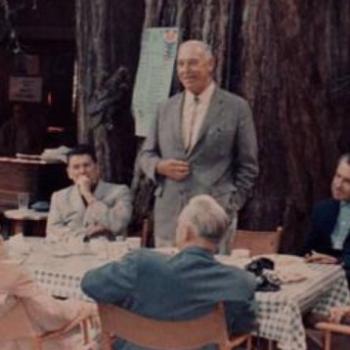According to the New Testament book of Acts, the apostle Peter was given a vision from God. The 10th chapter of Acts describes that vision. And in that chapter and the next, Peter himself explains what that vision meant.
Southern Baptist enforcer R. Albert Mohler Jr. says that Peter was wrong. The vision from God, Mohler says, meant something else.
“The Bible condemns a lot, but here’s why we focus on homosexuality,” Mohler writes today for CNN’s Belief Blog. Here’s Mohler:
“Look,” we are told, “the Bible condemns eating shellfish, wearing mixed fabrics and any number of other things. Why do you ignore those things and insist that the Bible must be obeyed when it comes to sex?”
On its face, it’s a fair question. But it can be posed in two very different ways.
First, the question can be asked to suggest that the Bible’s clear condemnation of sexual sins can simply be set aside. The other way of posing the question represents a genuine attempt to understand how the Bible is to be rightly applied to life today.
In truth, those asking the question the first way really don’t want an answer.
Fair point, but after dismissing those who ask the question dismissively, Mohler offers his response to those who ask it from “a genuine attempt to understand.”
It is here that Mohler tells us that the apostle Peter was wrong — that Peter misunderstood his vision from God in the Book of Acts and that, even worse, Peter spread this misunderstanding as a false prophet in the early Christian community.
Most of the biblical laws people point to in asking this question, such as laws against eating shellfish or wearing mixed fabrics, are part of the holiness code assigned to Israel in the Old Testament. That code was to set Israel, God’s covenant people, apart from all other nations on everything from morality to diet.
As the Book of Acts makes clear, Christians are not obligated to follow this holiness code. This is made clear in Peter’s vision in Acts 10:15. Peter is told, “What God has made clean, do not call common.”
In other words, there is no kosher code for Christians. Christians are not concerned with eating kosher foods and avoiding all others. That part of the law is no longer binding, and Christians can enjoy shrimp and pork with no injury to conscience.
I should note here that Mohler’s interpretation of Peter’s vision is widely held and quite popular among American Christians. (I wrote about this earlier in “The Abominable Shellfish: Why some Christians hate gays but love bacon.”)
But while popular, this view utterly contradicts Peter’s own interpretation of his vision. If Mohler is right, then Peter was wrong. If Peter was right, then Mohler is wrong.
For Peter, his rooftop vision wasn’t about kosher dietary laws — it was about people. He says this explicitly: “God has shown me that I should not call anyone profane or unclean.”
That’s a very different conclusion from the one Mohler draws. Mohler says this story — this scripture — is about purity laws. Peter says this story is about God’s commandment that no people should be excluded as impure.
I’m going to have to side with Peter on this one. Peter was right. Mohler is wrong.
Mohler’s case for his interpretation of Peter’s vision only looks plausible if you extract a tiny portion of the story from the rest of the chapter, but if you read all of Acts 10, you’ll see that the story doesn’t allow that.
Consider, for example, the purpose of Peter’s vision. It wasn’t sent because Red Lobster was about to bring back “endless shrimp,” but because of the people who were about to knock on Peter’s door. The author of Acts makes sure we don’t miss that point, writing: “While Peter was greatly puzzled about what to make of the vision that he had seen, suddenly the [impure, uncircumcised, bacon-loving Gentile] men sent by Cornelius appeared. They were asking for Simon’s house and were standing by the gate.”
And just in case you somehow miss that point, as Mohler does, the author of the book of Acts gets pretty anvilicious by repeating the whole thing in even more explicit terms in the very next chapter: “Peter began to explain it to them, step by step …”
And those chapters, again, must be read in the context of the entire book of Acts, which begins with Pentecost — bringing together people “from every nation under heaven … Parthians, Medes, Elamites, and residents of Mesopotamia, Judea and Cappadocia, Pontus and Asia, Phrygia and Pamphylia, Egypt and the parts of Libya belonging to the Cyrene, and visitors from Rome, both Jews and proselytes, Cretans and Arabs” — and continues inexorably outward to include and embrace European tradeswomen and African eunuchs and anyone else the author can imagine the reader otherwise being tempted to exclude or reject. The book reads like an after-school special on celebrating diversity.
People — all kinds of people. No one is excluded. Not purity laws but people. That a major theme throughout the entire book. And not just that book, either.
“God is showing us that we should not call anyone profane or unclean.”
















